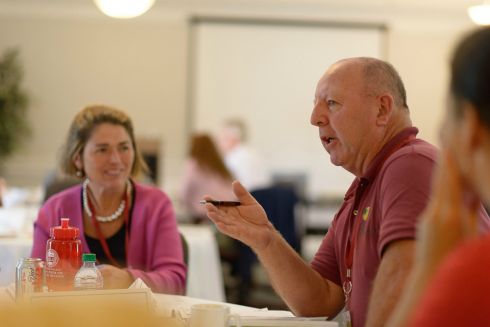February 8, 2013
New programs aim to help Catholic elementary school principals
NATIONAL

(CNS photo/John Gillooly, courtesy of Boston College)
By Carol Zimmermann
Catholic News Service
WASHINGTON (CNS) — Catholic elementary school principals — often the first to arrive and the last to leave school each day — have a lot on their plates.
They oversee students, faculty members and building maintenance all while ensuring the school’s Catholic identity and operating on a shoestring budget.
“I think being a Catholic school principal is the most rewarding and challenging job anyone could have,” said former principal Kathy Mears, who remembers getting calls at the school office at 6:30 a.m. and 6:30 p.m., and at both times people who called “thought I should be there.”
Mears is now the executive director of the elementary schools department for the National Catholic Educational Association, which offers programs specifically designed to help principals manage the ever-expanding issues that cross their desks each day.
During the summer, the NCEA sponsors a three-day Catholic School Leadership Institute for principals and administrators. It also is hoping to provide related webinars for principals during the school year, although Mears noted that the convenience of an online program prevents the important ability to build a support network.
“Our church is about community,” she told Catholic News Service, emphasizing the importance of school leaders working together and helping each other long after seminars are over.
That also is the theory behind the Emmaus Leadership Series, a three-day summer program for Catholic school principals in New England offered by the Roche Center for Catholic Education at Jesuit-run Boston College.
The program gets its name from the Scripture passage that describes Jesus walking with his disciples on the road to Emmaus. And ideally, participating principals develop a camaraderie that enables them to support one another and help each other with similar challenges.
Larry Fitzgerald, principal at Sacred Heart School in Groton, Conn., in the Norwich Diocese, and recent participant in the Emmaus program said he developed a great “support system” and feels free to contact other principals he met to hear how they deal with different situations.
A topic he’ll gladly get advice on is finances. He told CNS that he often wonders how his schools will raise money it needs to pay for current technology and also just to stay afloat. That money, he said, is not nearly met by tuition which is why elementary schools are increasingly tapping into grants, doing more fundraising and as a new trend: tapping into the elementary school alumni.
Joan Barry, principal of St. Mary’s in Shrewsbury, Mass., in the Worcester Diocese, who also participated in the Emmaus program, likewise noted that finances are one of her biggest issues. The former public school principal noted that her school, built 50 years ago, now needs to replace its computers and has to come up with the funds for it — which would have been available at a public school.
She also is trying to tap into alumni donors, which she admitted is an entirely new dimension of her work. “People will give to their high schools or colleges,” she noted, but they are not accustomed to giving back to their elementary schools.
She said the role of principal of a parish school is akin to being “your own superintendent” because you “have to think about things you never had to” which in her case this year was getting rid of termites in the preschool, certainly not a planned expense.
Still she says of her job: “I absolutely love it” and acknowledges that she gets “recharged just going to students’ classrooms.”
Father Ronald Nuzzi, one of the authors of the book Striving for Balance, Steadfast in Faith, based on a 2010 Notre Dame study of U.S. Catholic elementary school principals, points out that today’s principals are expected to do too much and need support from the church to do their job better.
The study, completed by the University of Notre Dame’s Alliance for Catholic Education and its Mary Ann Remick Leadership Program, examined responses of 1,685 Catholic school principals from across the United States.
Father Nuzzi, a priest of the Diocese of Youngstown, Ohio, and director of Catholic Leadership Programs in the Alliance for Catholic Education, told CNS that the increasing demands on Catholic elementary school principals — from handling leaky roofs to acquiring new technology — makes it imperative to find ways to help them.
One way is through seminars for professional development offered not only by Boston College but other Catholic colleges such as St. John’s University in Queens, N.Y. and Loyola University Chicago.
Another option he suggests is adopting the model many high schools currently use: dividing leadership responsibilities between a principal and a president. With the president handling fundraising and alumni development, the principal can focus on being the main academic and spiritual leader.
He realizes not all schools can afford this but suggests they could develop a regional approach to the idea of sharing a school president among local schools.
The book notes: “The church seems to have hired well, attracting mission-driven and loyal individuals to the overarching goals of Catholic education,” but it adds that these principals “live daily with what has been called ‘the tyranny of the urgent,’ hungering for more support — emotional as well as financial.”
If NCEA’s Mears could give the nation’s Catholic school principals one thing, it would be time.
“That’s the number one thing they need,” she said. Obviously she can’t provide that in a seminar, but she said programs that help principals use their time more efficiently are certainly a start.


 Facebook
Facebook Youtube
Youtube
